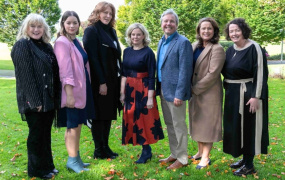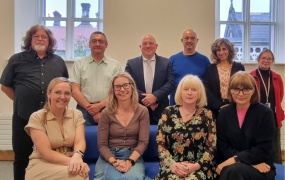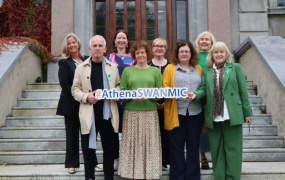Research Excellence
A High-Performing Research Environment
Mary Immaculate College (MIC) continues to affirm its position as a research-performing institution of national and international standing, with a mission to generate knowledge that is transformative, engaged, and deeply rooted in the College’s values of human dignity, educational excellence, and social justice.
The academic year 2023–24 witnessed exceptional research productivity across all faculties, evidencing a strong scholarly culture and a maturing research infrastructure that supports sustained intellectual leadership.
Over the 2023–24 academic year, researchers at Mary Immaculate College produced more than 440 scholarly outputs, reflecting a vibrant, multidisciplinary research environment. These encompassed peer-reviewed journal articles, authored and edited monographs, scholarly book chapters, commissioned research reports, and presentations, all showcased through national and international academic fora. The outputs originated from the Faculty of Education, the School of Education at Thurles and the Faculty of Arts. In the Faculty of Arts, for instance, peer-reviewed work appeared in journals such as Geographical Journal and Electronic Journal of Combinatronics, reflecting geography and mathematics research streams, while broader contributions included publications on Irish literature, Irish history, philosophical inquiries into noise and consciousness, and musicology. Similarly, Education Faculty outputs covered domains from critical thinking and digital pedagogy to wellbeing, inclusive practice, STEM engagement, Universal Design for Learning, and teacher identity - demonstrating the interplay between professional practice and original scholarship. The full spectrum of research outputs is now available within PURE, the leading Current Research Information System (CRIS) database, and is fully searchable there and through the College’s own CRIS, MIRIS, which was developed during the reporting year.
This breadth across professional programmes, grounded in rigorous academic study, underscores MIC’s dual role as a research-performing higher education institution and a generator of praxis-engaged knowledge, contributing substantively to academic advance, public discourse, and community-centric knowledge transfer.
MIC’s research is distinguished by its integration with professional academic networks, with outputs appearing in high-quality, peer-reviewed journals such as Irish Educational Studies, Pastoral Care in Education, Frontiers in Education, Research Studies in Music Education, and Religions, among others. Substantial contributions were also made through policy-focused and commissioned reports that were peer-reviewed and disseminated through professional channels, including research commissioned by the NCCA, the Teaching Council, and networks such as SCoTENS.
Grounding Programmes in Research
A defining characteristic of MIC’s academic identity is the close integration of research and teaching. Across initial teacher education, inclusive education, psychology, music, applied linguistics, and beyond, academic programmes are grounded in original research and scholarly inquiry. This scholarly integration ensures that MIC’s professional and postgraduate programmes remain responsive, current, and critically informed.
Structured doctoral programmes (PhD, EdD, and research master’s) continued to grow in strength, with a number of successful doctoral completions this year in areas such as inclusive pedagogy, mindfulness in education, wellbeing and leadership, critical digital literacies, and teacher professional learning. MIC’s Research & Graduate School has played a central role in facilitating this development, providing researchers with ethics support, funding guidance, publication mentorship, and a robust environment for interdisciplinary collaboration.
Research for Public Good and Praxis
Beyond the academy, MIC researchers are committed to the dissemination and transfer of knowledge to wider communities. Research conducted at the College actively informs public policy, professional practice, and social understanding. Outputs such as the Toolkit for Supporting Children in Care and national studies on teacher wellbeing, the inclusion of neurodivergent learners, and the role of mindfulness in post-Catholic education demonstrate MIC’s ability to produce research that is not only academically rigorous but also socially engaged and practice-based.
Scholarly work on Universal Design for Learning (UDL), inclusive assessment, and collaborative practices between classroom teachers and allied professionals is directly shaping school-level practices and teacher education frameworks. Similarly, MIC’s arts and humanities research has extended its influence into cultural, historical, and linguistic domains, with outputs in corpus linguistics, gender studies, Irish identity, and music pedagogy contributing meaningfully to public discourse.
Catholic Education Research Initiative
Following the most comprehensive piece of research into the ethos of Catholic primary and secondary schools in Ireland since the foundation of the state, a series of reports (six), entitled Identity and Ethos in Catholic Primary and Secondary Schools in Ireland: Exploring the Attitudes and Behaviours of Stakeholders, was published on 23 April.
The body of research, which included feedback from 4,000 members of Boards of Management, Principals and Teachers in Catholic schools, was undertaken by a team of academic researchers, based at Mary Immaculate College (MIC) and the Mater Dei Centre for Catholic Education, as part of the Global Researchers Advancing Catholic Education (GRACE) project, to establish a clear baseline and a set of signposts for the advancement of Catholic education at primary and secondary levels in the Republic of Ireland.
Over the course of three years, the research team explored the identity and ethos in Catholic primary and secondary schools in Ireland, examining the relationship between the stated policy regarding the Catholic identity of these schools and the lived reality within them.
- A High-Performing Research Environment
- Grounding Programmes in Research
- Research for Public Good and Praxis
- Catholic Education Research Initiative







